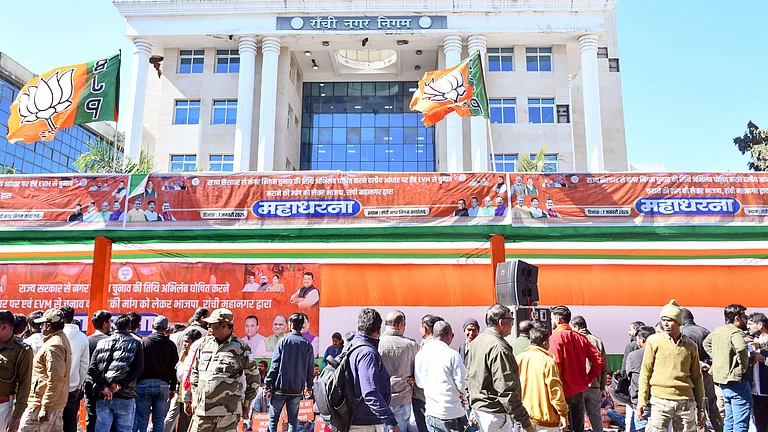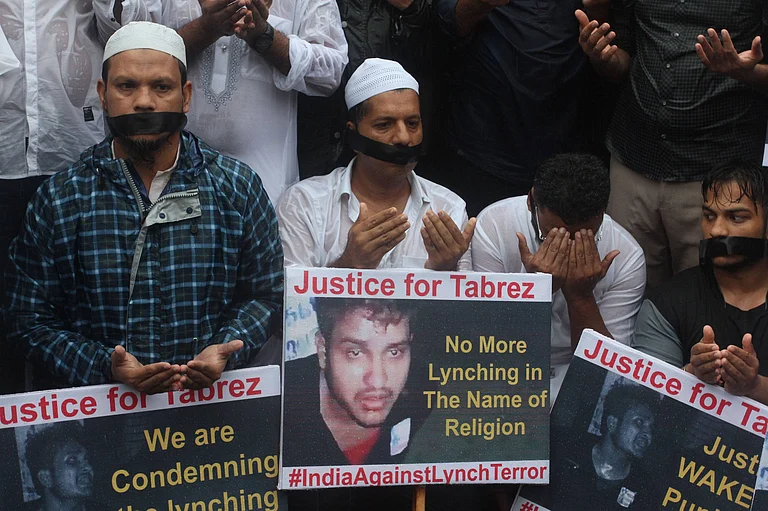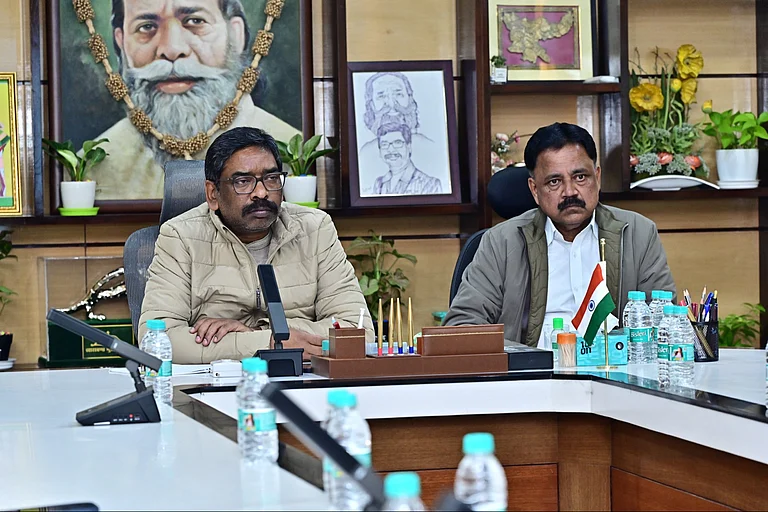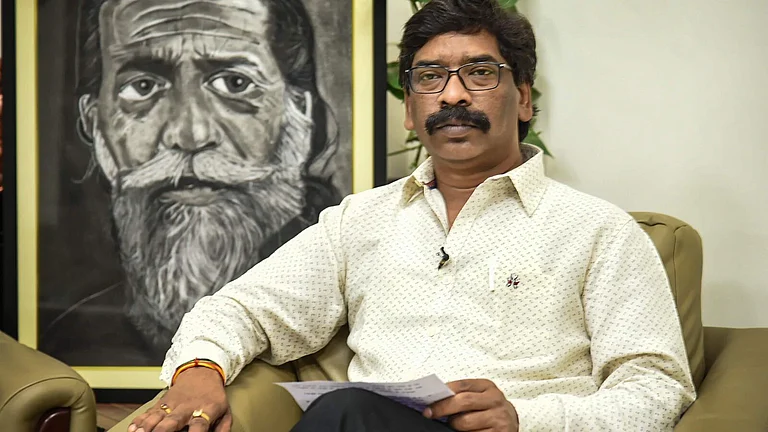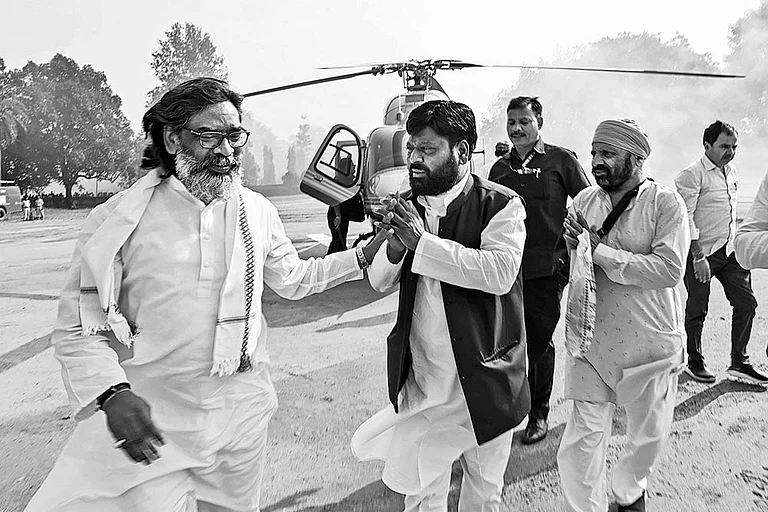As the Jharkhand state assembly election results are trickling in, it is becoming more and more clear that the Adivasis in the state have again rejected the BJP-led NDA. After the first four rounds of counting, the JMM-led INDIA is leading in almost 50 out of the 81 assembly constituencies.
Adivasis comprise 26 per cent of the electorates in Jharkhand. Mostly spread across the Kolhan and Santhal regions, Jharkhand has 28 ST reserved seats.
These seats always play a crucial role in determining the fate of political parties, both in the state assembly and the Lok Sabha elections. In the 2024 Lok Sabha elections, the BJP lost all the five ST-reserved seats.
The saffron party, for the first time, tried its best to address Adivasis—but with a tweak. They evoked the issue of ‘Bangladeshi infiltrators’ in Muslim-dominated districts of Pakur, Sahebgunj and Dumka.
They deployed Assam Chief Minister Himanta Biswa Sarma as the election-in-charge who earlier successfully used this trope to win his home state. They alleged that Bangladeshi infiltrators are taking away land and women from Adivasis through what they term ‘land jihad’ and ‘love jihad’.
In contrast, the JMM with its traditional Adivasi vote base, gave a call for ‘Abua Sarkar’. This word Abua was first invoked by legendary Adivasi figure Birsa Munda against the Britishers. Both Hemant Soren and Kalpana Soren accused the BJP of being a party of outsiders who came from Gujarat.
The sentiment of outsiders taking away Adivasi lands has always resonated in the history of Jharkhand politics. It was the major plank behind the Jharkhand statehood movement as well. Soren used the insider-outsider debate and his resemblance to his father Shibu Soren made people walk through the memory lanes of the statehood movement.
One factor that stands out for the BJP’s apparent defeat on an Adivasi-dominated seat is the sympathy that Hemant Soren received after his arrest by the ED for his alleged role in a land grab scam. One of the JMM supporters from Ranchi says: “They arrested an Adivasi. How can we vote for them?”
In the 2014 elections, the BJP won 11 of the 28 ST seats and formed the government. They deployed a non-Adivasi CM for the first time in the history of the state. It didn’t go well with the Adivasis.
Within a couple of years, Raghubar Das, the newly appointed BJP CM, tried to tinker with the Santhal Pargana Tenancy Act and the Chhota Nagpur Tenancy Act, leading to huge protests among Adivasis. It was the time when the BJP apparently lost its support among Adivasis, says an analyst.
However, in the recent times, they tried to pander this constituency through several means. Prime Minister Narendra Modi himself visited Birsa Munda’s village on his birth anniversary in 2023. He also announced projects worth Rs 24,000 crore for the PVTGs across the country.
This year, on the 150th birth anniversary of the legendary Adivasi leader Union Minister Amit Shah changed the name of Delhi’s Sarai Kale Khan Chowk to Birsa Munda chowk. Even such efforts to symbolically placate the community didn’t work.
Political analysts point out that in Jharkhand, it is difficult to invoke the communal sentiments. Adivasis and Muslims have been staying here together for more than 800 years. “One cannot separate an Adivasi from Muslim in the rural parts of the state,” says Zubair Ahmed, a renowned Jharkhand Andolankari who invested his whole life to get the statehood.
Against this backdrop, the BJP also tried to gain some grounds among Adivasis by taking a disenchanted Champai Soren to his fold. When Champai was asked by Hemant to empty the CM’s post, the BJP used the moment prudently.
Champai, known as the Kolhan tiger, was supposed to get some seats for the BJP in the region that has 14 seats. In the 2019 assembly elections, the BJP failed to win a single seat from this area. The BJP gave tickets to both Champai Soren and his son Babulal Soren from Saraikela and Ghatshila, respectively.
In 2019, the BJP fought the election only with the JD(U). But this time, they managed to bring back former CM Babulal Marandi and forged an alliance with All Jharkhand Students Union, a party with formidable Mahato votes. It was expected that Marandi would pull back some Adivasi votes towards the BJP.
The BJP also exempted Adivasis from the ambit of the proposed UCC in a bid to not affect their customary laws.
But for Adivasis, what mattered was the sympathy for Soren, the Sarna code bill and the proposed domicile policy. In 2020, within a year of coming to power, Soren passed the Sarna Code bill. The very next year, he passed the domicile policy and proposed to increase the reservation for the SC, ST and OBC communities.
These factors, coupled with developmental schemes like Maiya Samman Yojana, Abua Awas Yojana and Abua Swasthya Yojana, helped the JMM to hold its ground.








